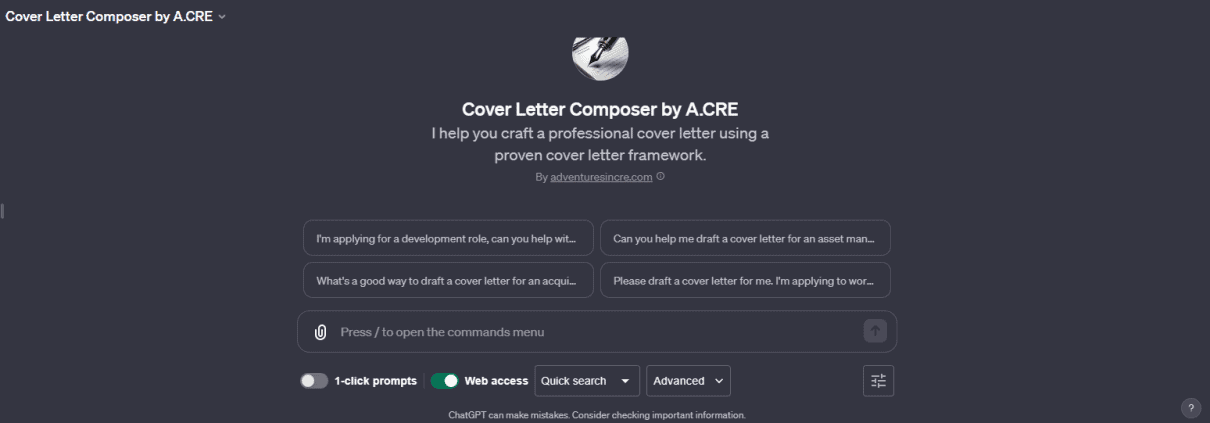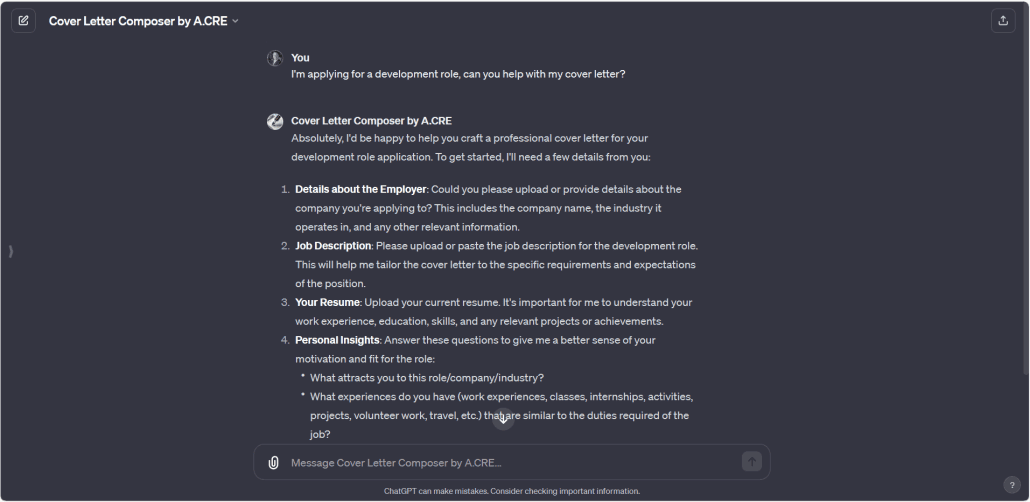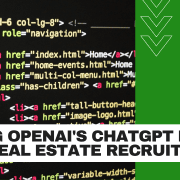We Trained This AI Tool to Write Cover Letters
As we enter a new year, it’s an ideal moment for CRE professionals to recalibrate and prepare for the challenges ahead – for some of you that means applying for new jobs. First impressions matter a lot in the job search, and for most job applications that first impression is made with the cover letter.
Leveraging my deep interest in AI and its transformative potential in CRE, I’ve trained a specialized AI tool specifically for this task: the ‘Cover Letter Composer by A.CRE‘. This is a custom GPT (Generative Pre-trained Transformer) created to assist commercial real estate professionals in crafting compelling and impactful cover letters.
- Important: As of January 2024, custom GPTs are only available for ChatGPT Plus members
In this blog post, I’ll briefly explain what OpenAI custom GPTs are, share a link to my Cover Letter Composer GPT, show how to use it, and provide a basic overview of how to create your own GPT using ChatGPT similar to this one.
So, let’s dive in!
What Are Custom GPTs?
Custom GPTs are innovative adaptations of the ChatGPT AI model, designed for specific purposes or industries. Introduced by OpenAI, these specialized models offer a new dimension of flexibility and utility for AI chatbots, allowing users to tailor the technology to their unique requirements. This feature is especially significant in fields that demand specialized knowledge, like commercial real estate, enabling professionals to create AI assistants that cater to their distinct needs.
Creating a Custom GPT is straightforward and does not require coding skills. Users can start by giving the AI model specific instructions and extra knowledge, then select its capabilities, such as web searching, image creation, or data analysis. This level of customization extends beyond setting preferences, enabling the integration of various skills and knowledge areas. The development of Custom GPTs is not limited to tech experts but is accessible to anyone, encouraging innovation across different sectors.
- You might also be interested in our recent post on custom GPTs in the context of commercial real estate
What is the Cover Letter Composer by A.CRE?
The ‘Cover Letter Composer by A.CRE‘ is a custom GPT built in ChatGPT trained on a proven framework for crafting effective cover letters. It starts by gathering essential information about you, the employer, and the job description. The tool then processes details from your resume and the job posting, aligning your skills and experience with the specific requirements of the role.
What sets the tool apart is its ability to generate a personalized cover letter that not only matches your profile with the job’s demands but also incorporates your personal motivations and aspirations. It’s designed to highlight key aspects like your leadership skills, investment acumen, or any unique qualifications you possess, ensuring that your application stands out.
As you interact with the Cover Letter Composer, it prompts you for relevant details and uses these to draft a custom cover letter. The draft can be reviewed and revised as needed, ensuring it aligns well with your professional persona. Once you’re satisfied, the GPT tool can convert the final draft into a Word document, ready for final touches and submission.
How to use the ‘Cover Letter Composer by A.CRE’
- Access the GPT: Go to “Cover Letter Composer by A.CRE” on ChatGPT.
- Initial Interaction: Enter a prompt like “I need to create a cover letter.” You will find some examples you can select/send by just clicking on them:
- “I’m applying for a development role, can you help with my cover letter?”
- “Can you help me draft a cover letter for an asset management job?”
- “What’s a good way to draft a cover letter for an acquisitions role?”
- “Please draft a cover letter for me. I’m applying to work for a brokerage firm.”
- Provide Basic Information: Once the GPT receives your request, it will start asking for your basic information, you will need to share your name, job details, and professional background.
- Detailed Job Information and Experience: As it continues gathering information, the GPT will then ask you about the job role you are applying to, including job description and employer details, and experiences and skills relevant to the job.
- Drafting the Cover Letter: The GPT will draft your cover letter, including heading, salutation, introduction, body, and conclusion.
- Review and Edit: Review the draft for accuracy and tone, and make edits as needed.
- Further Interaction: Continue to refine the letter with the GPT, providing feedback and additional information for customization.
- Export to Word Document. Once a final draft is ready, the GPT will convert the letter to Word for you to format and finalize.
By following these straightforward steps, you can efficiently employ the ‘Cover Letter Composer by A.CRE’ to produce a professional and personalized cover letter, enhancing your job application process.
Video demonstration: Using the Cover Letter Composer by A.CRE GPT
To provide you with a better understanding of the functionality of the ‘Cover Letter Composer by A.CRE’ GPT, I’ve created a brief video walkthrough. This video illustrates the tool’s purpose and how to effectively use it in your job search.
Conclusion
In your job search, making a memorable first impression is key. The ‘Cover Letter Composer by A.CRE’ is meant to improve the quality of that first impression. We are excited to share this GPT with A.CRE readers and hope it not only streamlines your application process but also inspires you to leverage AI for your own professional growth.
Here’s to crafting impactful cover letters and embracing new opportunities!










